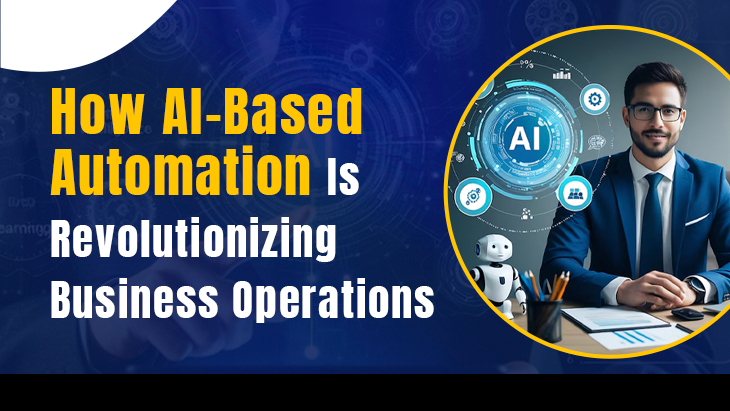In today's fast-paced business environment, staying ahead of the competition requires constant innovation, and few technologies have impacted modern businesses as profoundly as artificial intelligence (AI). Specifically, AI-based automation is transforming the way companies operate, driving efficiency, reducing costs, and enabling smarter decision-making. This blog explores how AI-based automation is revolutionizing business operations and the key benefits it offers across various sectors.
What is AI-Based Automation?
AI-based automation refers to the use of artificial intelligence to automate processes traditionally performed by humans. Unlike traditional automation that follows pre-programmed instructions, AI automation uses machine learning and data analysis to perform tasks intelligently, adapt to new inputs, and make decisions without human intervention. This makes it an ideal solution for complex, data-heavy operations that require speed and accuracy.
Key Areas Where AI-Based Automation is Making a Difference
Streamlining Administrative Tasks
AI-powered automation tools can handle repetitive, time-consuming tasks like data entry, scheduling, and document management with far greater speed and accuracy than human employees. Automated systems like AI-based chatbots, virtual assistants, and workflow automation tools help businesses reduce the need for manual work, freeing up employees to focus on more strategic activities.
Enhancing Customer Service
AI-based automation is transforming customer service by providing personalized, real-time responses through chatbots and virtual assistants. AI tools analyze customer queries, predict their needs, and provide relevant solutions without human intervention. Businesses benefit from enhanced customer satisfaction, quicker response times, and reduced operational costs by automating routine customer service tasks.
Improving Decision-Making with AI Insights
One of the key advantages of AI-based automation is its ability to process vast amounts of data quickly and efficiently. AI tools can analyze data patterns, identify trends, and generate actionable insights that guide decision-making. For example, predictive analytics helps businesses anticipate customer behavior, market trends, and even financial outcomes, allowing companies to make data-driven decisions with confidence.
Optimizing Supply Chain Management
Supply chains are complex ecosystems that involve multiple stages from production to delivery. AI-based automation is revolutionizing supply chain management by improving efficiency, reducing delays, and lowering costs. Automated systems can monitor inventory levels, track shipments, forecast demand, and even predict potential supply chain disruptions. Businesses that adopt AI in their supply chains benefit from smoother operations, reduced costs, and improved delivery times.
Sales and Marketing Automation
AI-powered marketing automation tools are helping companies target customers more effectively. These tools analyze customer data to understand purchasing habits, preferences, and online behavior. With AI-driven marketing automation, businesses can create personalized campaigns, optimize advertising spend, and enhance lead generation efforts. The result? Higher conversion rates and improved return on investment (ROI).
In sales, AI-driven customer relationship management (CRM) systems help sales teams manage leads, forecast sales, and automate follow-ups, allowing sales professionals to focus on closing deals rather than administrative tasks.
Transforming Human Resources
AI-based automation is also changing how businesses manage their workforce. AI tools are used to automate recruitment processes, including resume screening, interview scheduling, and candidate assessments. Machine learning algorithms can analyze candidate profiles and match them with job requirements, making recruitment faster and more efficient. Additionally, AI tools help HR teams monitor employee performance, manage payroll, and streamline other administrative tasks, resulting in improved productivity.
Financial Automation
In the finance sector, AI-based automation is playing a critical role in transforming financial operations. Automated systems can perform tasks such as transaction processing, fraud detection, tax preparation, and compliance management. AI tools also provide real-time insights into cash flow, expenses, and revenue, helping businesses make informed financial decisions. With AI, financial departments can reduce human error, cut costs, and increase operational efficiency.
Manufacturing and Production Automation
AI-based automation is revolutionizing the manufacturing industry by optimizing production lines, reducing downtime, and improving product quality. AI systems analyze real-time data from production equipment, identify potential malfunctions, and predict maintenance needs, which minimizes disruptions. In addition, AI-powered robots can handle dangerous or repetitive tasks, increasing workplace safety and productivity.
The Benefits of AI-Based Automation in Business Operations
1. Increased Efficiency: AI-powered automation tools handle tasks faster and more accurately than humans, leading to significant productivity gains.
2. Cost Reduction: Automating repetitive tasks reduces labor costs and minimizes errors, leading to overall cost savings.
3. Scalability: AI systems can scale easily, handling increasing volumes of data and tasks without requiring a proportional increase in resources.
4. Improved Decision-Making: AI’s data analysis capabilities provide businesses with insights that improve decision-making, enabling more effective strategies and processes.
5. 24/7 Operation: Unlike human employees, AI-powered systems can work around the clock, improving response times and ensuring continuous operation.
6. Error Reduction: Human errors, which can be costly, are minimized through automation, enhancing accuracy and reliability in business processes.
7. Enhanced Customer Experience: By automating customer interactions, businesses can offer faster, personalized support, leading to higher customer satisfaction.
8. Competitive Advantage: Companies that adopt AI-based automation gain a competitive edge by streamlining operations, reducing costs, and improving customer service.
Real-World Applications of AI-Based Automation
Amazon: The retail giant uses AI-powered automation in its warehouses, employing robots to pick and pack items efficiently. AI is also used to forecast customer demand and manage inventory.
Tesla: Tesla’s manufacturing facilities are heavily automated, with AI systems managing robotic arms, assembly lines, and quality control processes.
Netflix: AI is at the heart of Netflix's recommendation engine, which analyzes user behavior and preferences to suggest personalized content, increasing user engagement.
Challenges in Implementing AI-Based Automation
While AI-based automation offers numerous benefits, its implementation is not without challenges:
1. Initial Costs: Deploying AI systems can require significant investment in technology, infrastructure, and employee training.
2. Workforce Displacement: As AI automates more tasks, businesses must navigate the challenge of retraining employees and managing potential job displacement.
3. Data Security: AI systems rely on large datasets, raising concerns about data privacy and security.
4. Complex Integration: Integrating AI into existing systems can be complex, requiring technical expertise and careful planning.
FAQs About AI-Based Automation
What is AI-based automation?
AI-based automation uses artificial intelligence to perform tasks traditionally done by humans, such as data analysis, decision-making, and process automation.
How does AI automation differ from traditional automation?
Traditional automation follows predefined rules, while AI-based automation uses machine learning to adapt and make decisions based on data inputs.
What are the key benefits of AI-based automation for businesses?
The key benefits include increased efficiency, cost reduction, scalability, improved decision-making, and enhanced customer experience.
What industries can benefit from AI-based automation?
Almost every industry can benefit from AI automation, including finance, healthcare, manufacturing, retail, and logistics.
Does AI automation eliminate the need for human workers?
While AI automates certain tasks, it often complements human workers, allowing them to focus on higher-value activities.
Is AI-based automation expensive to implement?
The initial cost can be high, but the long-term savings in efficiency, productivity, and error reduction often justify the investment.
How can AI improve customer service?
AI-powered chatbots and virtual assistants provide real-time, personalized customer support, reducing response times and improving satisfaction.
What is predictive analytics, and how does it help businesses?
Predictive analytics uses AI to analyze historical data and predict future trends, helping businesses make data-driven decisions.
How does AI-based automation impact supply chain management?
AI automates inventory management, demand forecasting, and logistics, resulting in more efficient supply chain operations.
Is AI-based automation secure?
While AI offers many benefits, it’s important to implement strong data security measures to protect sensitive information from cyber threats.
Conclusion
AI-based automation is reshaping the way businesses operate, offering unparalleled efficiency, cost savings, and improved decision-making. As more companies embrace AI, the future of business operations will continue to evolve, creating new opportunities for growth and innovation. Whether it's customer service, supply chain management, or financial processes, AI is driving a transformation that’s here to stay.
Embrace the power of AI-based automation and transform your business today!

















Post Comments